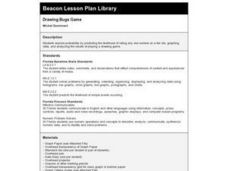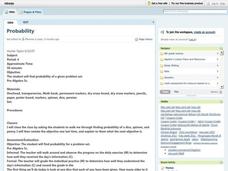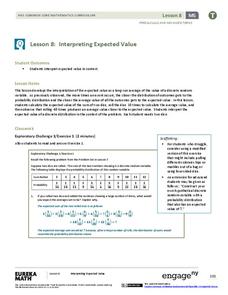Curated OER
Probability
Sixth graders explore theoretical and experimental probability. In this probability lesson, 6th graders participate in several hands-on activities involving the comparison of theoretical probability to the actual results. Games include...
Curated OER
Probability
Learners explore probability. In this probability lesson, students define theoretical probability and experimental probability. Learners predict outcomes of hands on activities using coins and colored tiles, complete a chart...
Curated OER
Calculating Theoretical & Experimental Probability
Learners collect data by conducting a survey of fellow classmates. They investigate the relationship between estimates obtained from samples and theoretical probabilities. Answer keys included.
Curated OER
Probability in Daily Life
Sixth graders examine the use of probability in daily life. For this probability lesson, 6th graders listen to scenarios from Louis Sachar's, Holes, after discussing probability in everyday life. They pretend they are detectives who are...
Curated OER
Excel Probability with Dice
Pupils play a dice game to complete probability exercises. In this probability lesson, students collect data using a dice game and organize it into a spreadsheet format. Pupils also write a lab report for an experiment on probability.
Curated OER
Even/Odds Game
Using a game format, learners review what they know about theoretical probability. As they roll tetrahedron dice, they record their results as odd or even. Afterwards, they discuss their findings.
Curated OER
Data Analysis and Froot Loops
Use this probability and graphing lesson to have your learners work with a partner to make a necklace out of Froot Loops. They record the cereal colors randomly chosen and strung, graph their data, then use a ratio formula to determine...
Curated OER
Drawing Bugs Game
Second graders explore probability by playing a drawing game with dice. After they roll a die, they draw a tree diagram to illustrate each of the possible outcomes.
Curated OER
The Game of Chance
Third graders use manipulatives to determine the probability of outcomes. In this probability activity, 3rd graders roll dice and use spinners to determine the probability of outcomes. They determine if games are fair/unfair based on...
Actis
Handling Data: Probability, Tree Diagrams
Clean, but captivating, two online simulations demonstrate probability for middle schoolers. They can choose the number of coins and tosses and watch as the results pile up. They can choose from a variety of spinner types and the number...
Curated OER
"Eggs-ploring" Math with Jellybeans
Learners work in pairs with a small bag of jellybeans to estimate the number of candies in their bags and then figure out how many groups of 10 jellybeans are contained in their bags. They then graph the information using a pictograph or...
Curated OER
Probability
Fifth graders observe a dice, talk about how many sides it has and use that number as the number that would go in the denominator's spot on a fraction. They then discuss what the likelihood is of it landing on 4, and put that number in...
Curated OER
Playing With Probability
Students rotate through work stations where they compute problems of theoretical and experimental probability. In this probability lesson plan, students use simulations of a lottery system.
Curated OER
Plum Stone Dice Game
Students read about a Native American dice game online. They make replica games, and practice playing with them. They predict the outcome of the dice rolls by completing a dice throw chart.
Curated OER
Probability
Third graders conduct experiment, collect data, predict, record, and discuss outcomes, and analyze data for probability.
Curated OER
Probability
Students complete various activities for probability. In this probability instructional activity, students use coins, cubes, peanut butter and jelly, playing cards, number cubes, darts, and a Gauss Curve to study probability. Students...
EngageNY
Interpreting Expected Value
Investigate expected value as a long-run average. The eighth installment of a 21-part module has scholars rolling pairs of dice to determine the average sum. They find aggregate data by working in groups and interpret expected value as...
EngageNY
Games of Chance and Expected Value 1
There's a strong chance that class members enjoy learning math through engaging games. Scholars analyze games of chance to determine long-term behavior. They learn to calculate expected value to help with this assessment.
Curated OER
Phenomenological Probability
High schoolers explore the concept of theoretical and experimental probability. In this theoretical and experimental probability lesson, students roll dice, draw marbles out of a bag, and draw a card from a deck of cards. High schoolers...
Curated OER
Investigating the Probability
Students investigate probability using coins and dice. They collect data, graph, organize and interpret data. They predict, describe, compare, compute and draw conclusions based on what they observe and record.
Curated OER
Handling Data: Probability, Chase Me game
Learners participate in a simulation in which the aim is for the tortoise to catch up with the hare or vice versa. Moves are decided by throwing two dice. Adding together the numbers on the two dice tells you which animal moves one...
Curated OER
From Probability to Combinatorics and Number Theory
Students see how division is used to help solve probability problems. They use tables as data structures where they are used to count outcomes and to compute probabilities. Students use games to help solve probability problems.
Curated OER
Probability Lesson Plan
Your learners will examine probability through experiments and dice games. Using a computer, your class will perform simple experiments to collect and analyze data to determine the probability of different experimental results. Students...
Curated OER
Probability: Playing With Fire
Students problem solve to find the probability of each tree in a small forest to catch fire. In this probability lesson plan, students use the computer to complete this application.

























